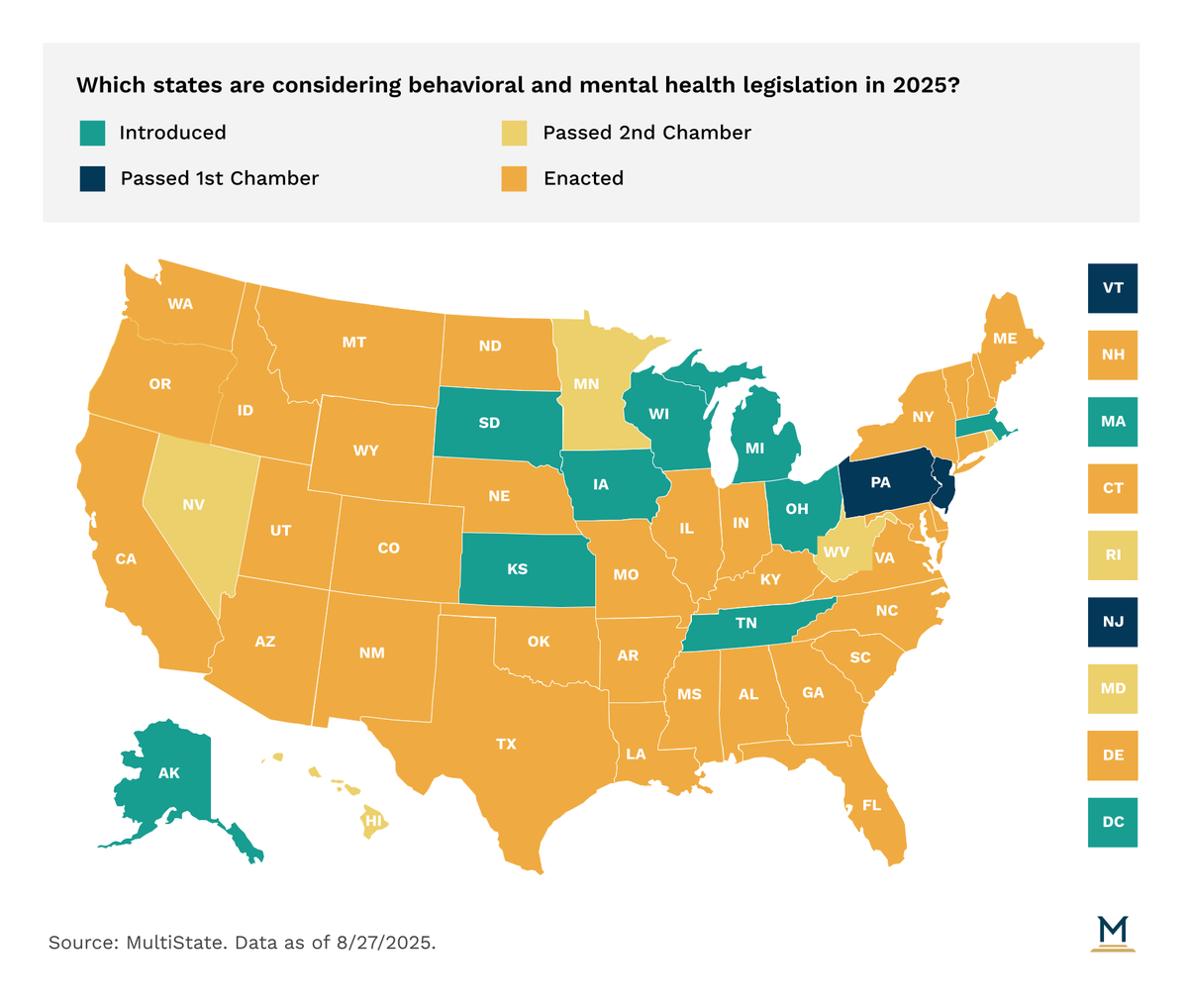Key Takeaways:
- Mental and behavioral health continues as a major state legislative focus, with 29 states enacting 75 bills addressing coverage mandates, parity requirements, workforce issues, crisis response, and school-based initiatives.
- Federal Mental Health Parity and Addiction Equality Act implementation is driving state responses, with Georgia, Alaska, Oklahoma, and Washington passing measures to ensure consistent utilization review for mental health and substance use disorder benefits.
- Workforce shortages remain a critical issue, with Texas expanding loan repayment programs up to $180,000 for psychiatrists and adding incentives for rural service, while New Mexico addresses workforce coordination through regional delivery systems.
- Crisis response infrastructure is expanding through initiatives like Maryland's statewide 988 Suicide and Crisis Lifeline system and Virginia's early childhood mental health screening programs for children birth to age five.
As anticipated, mental and behavioral health continues to be a focus of state legislatures. Behavioral and mental health legislation encompasses bills that mandate coverage of mental health evaluation, diagnosis, and treatment. It also includes bills that require coverage of treatment, either inpatient or outpatient, of substance use disorder. Legislation that requires parity of reimbursement for practitioners in the mental and behavioral health fields is also included. Parity means that coverage for mental health treatment should be covered in the same way, by insurance, as physical health treatment.
To date, this year, we’ve tracked 29 states enacting a total of 75 bills concerning mental health. Trending issues continue to be parity (including for substance use disorder treatment), mental health workforce issues, crisis response, and school-based initiatives.

Notable Developments in Behavioral Health Policy in 2025
Federal Parity Rules Drive State Legislative Response
Parity for behavioral health services, including substance use treatment, has been a hot topic of debate in the states thus far in 2025. The Georgia legislature passed a measure (SB 131) that establishes a “Parity Compliance Review Panel,” while Alaska (SB 45), Oklahoma (HB 2049), and Washington (HB 1432) have passed bills requiring insurance coverage of benefits with consistent utilization for mental health (including substance use disorder (SUD) conditions) in the same manner that medical and surgical benefits are covered. The Alaska and Oklahoma bills only relate to the Medicaid programs in the states, while the Washington bill includes all health carriers. These measures are in response to the Federal implementation of the Mental Health Parity and Addiction Equality Act (MHPAEA) and rulemaking that followed late in 2024. This will be a trend to continue watching.
New Mexico Makes Behavioral Health a Priority Focus
New Mexico Governor Grisham (D) made behavioral health a primary focus this session signing several measures including:
- NM SB 1 - Establishes a dedicated trust fund to provide sustainable financing for behavioral health programs.
- NM SB 3 - Creates a behavioral health executive committee to coordinate statewide reform efforts through a regionalized delivery system; the legislation also addresses mental health workforce issues.
- NM SB 120 - Eliminates cost-sharing for behavioral health services in the state. As a result, patients will no longer be required to pay out-of-pocket expenses like copayments, coinsurance, or deductibles for mental health and substance abuse treatment.
Texas Addresses Mental Health Workforce Shortages
Texas Senate Bill 646 expands the state’s Mental Health Professional Loan Repayment Program to address critical workforce shortages. It broadens eligibility to include associate-level counselors, school counselors with a master’s in counseling, and other licensed mental health professionals. The bill increases loan repayment caps across professions—up to $180,000 for psychiatrists—and adds financial incentives for working in rural areas, serving multiple years, or providing care in high-need languages. It also allocates funds for marketing and outreach, with the updated program launching on September 1, 2025.
Crisis Response and Early Childhood Initiatives Expand in Maryland
Maryland Senator Malcolm Augustine (D) and Delegate Jennifer White Hollandy (D) introduced Senate Bill 900/House Bill 1146, which requires the Maryland Behavioral Health Crisis Response System to establish a State 9-8-8 Suicide and Crisis Lifeline in each jurisdiction, replacing the existing crisis communication centers. The system will coordinate with the national 9-8-8 network to provide support services like suicide prevention, crisis intervention, referrals to additional resources, mobile crisis teams, and crisis stabilization centers. The bill requires evaluation and reporting of outcomes from these services, including data on crisis resolution, response times, and service usage, with annual public reporting. This legislation takes effect July 1, 2025.
Virginia's Focus on Children's Mental Health
Virginia HB 1760, enacted as the Infant and Early Childhood Mental Health Act, establishes a multidisciplinary work group to improve mental health support for children from birth to age five. The group, led by the Departments of Behavioral Health, Health, and Education, is charged with developing a statewide mental health screening and assessment tool, as well as training and consultation resources for early childhood educators, pediatric providers, and families. A final report with findings and recommendations is due to the General Assembly by November 1, 2025.
Track Health Care Policy with State Vitals
StateVitals is the leading resource on how state governments are shaping healthcare policy and transforming care and delivery, brought to you by MultiState’s Health Care Policy Practice. MultiState’s policy and advocacy professionals are uniquely positioned to give you and your organization the big-picture view on state health policy reform, plus the latest trends on how policymakers are thinking about healthcare and similar emerging issues. Learn more about StateVitals, or schedule a demo here.
